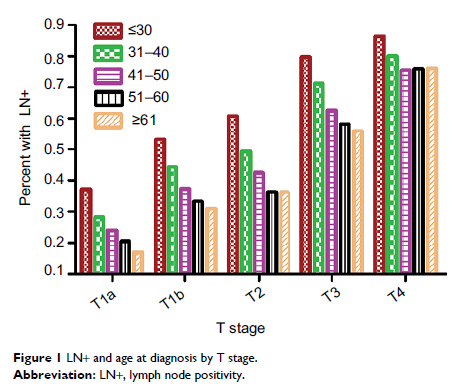108384
论文已发表
注册即可获取德孚的最新动态
IF 收录期刊
- 3.4 Breast Cancer (Dove Med Press)
- 3.2 Clin Epidemiol
- 2.6 Cancer Manag Res
- 2.9 Infect Drug Resist
- 3.7 Clin Interv Aging
- 5.1 Drug Des Dev Ther
- 3.1 Int J Chronic Obstr
- 6.6 Int J Nanomed
- 2.6 Int J Women's Health
- 2.9 Neuropsych Dis Treat
- 2.8 OncoTargets Ther
- 2.0 Patient Prefer Adher
- 2.2 Ther Clin Risk Manag
- 2.5 J Pain Res
- 3.0 Diabet Metab Synd Ob
- 3.2 Psychol Res Behav Ma
- 3.4 Nat Sci Sleep
- 1.8 Pharmgenomics Pers Med
- 2.0 Risk Manag Healthc Policy
- 4.1 J Inflamm Res
- 2.0 Int J Gen Med
- 3.4 J Hepatocell Carcinoma
- 3.0 J Asthma Allergy
- 2.2 Clin Cosmet Investig Dermatol
- 2.4 J Multidiscip Healthc

年轻人的乳头状甲状腺癌患者淋巴结阳性风险较高:一项以 SEER 数据为基础的研究
Authors Wang J, Liu J, Pan H, Jiang C, Liu S, Zhu Z, Fang J, Zheng X, Hong S, Wang S
Received 9 March 2018
Accepted for publication 30 May 2018
Published 25 September 2018 Volume 2018:10 Pages 3867—3873
DOI https://doi.org/10.2147/CMAR.S167774
Checked for plagiarism Yes
Review by Single-blind
Peer reviewers approved by Dr Colin Mak
Peer reviewer comments 3
Editor who approved publication: Dr Luzhe Sun
Introduction: Currently in papillary thyroid cancer (PTC), the correlation between lymph node positivity (LN+) and patient’s age at diagnosis is still inconclusive. The aim of this study was to investigate whether younger PTC patients had higher LN+ rates.
Patients and methods: From the 1998–2013 Surveillance, Epidemiology, and End Results database, we analyzed PTC patients with at least 1 LN examined. The patients were divided into 5 groups by age separately for each T stage: ≤30; 31–40; 41–50; 51–60; >60 years.
Results: A total of 46,077 PTC patients were identified, including 8,386 (18.2%) patients aged ≤30 years, 10,971 (23.8%) patients aged 31–40 years, 11,646 (25.3%) patients aged 41–50 years, 8,596 (18.7%) patients aged 51–60 years, and 6,478 (14.1%) patients aged >60 years. In each T stage, LN+ rates were inversely associated with age at diagnosis, which was validated by multivariate logistic regression analysis (p <0.001). In addition, the subset of patients 30 or younger had the highest lymph node ratio compared with other subsets (p <0.001).
Conclusion: We identified that younger PTC patients have an increased predisposition for LN+ regardless of T stage. This finding could help surgeons to select the optimal treatment for younger PTC patients.
Keywords: papillary thyroid cancer, age at diagnosis, lymph node positivity, lymph node ratio, recurrence, Surveillance, Epidemiology, and End results
